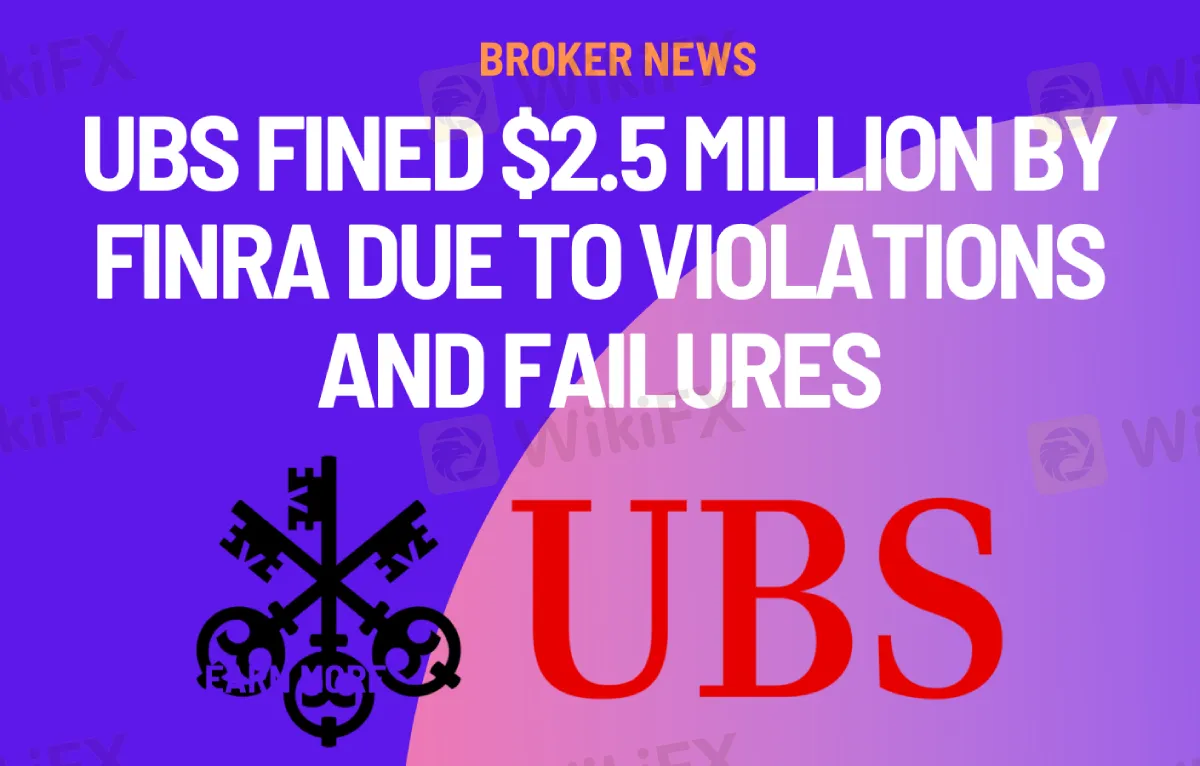UBS Fined $2.5 Million By FINRA Due To Violations and Failures
Abstract:According to the US regulator, from 2009 to 2018, UBS failed to complete at least 5,300 failure to deliver positions and routed or executed more than 73,000 short sells in securities with an unmet close-out requirement without first borrowing or arranging to borrow the shares.

According to the US regulator, from 2009 to 2018, UBS failed to close out at least 5,300 failure to deliver positions and routed or executed more than 73,000 short sales in securities with an unfulfilled close-out requirement without first borrowing or arranging to borrow the shares.
“The short sale duties established by Reg SHO provide vital protection to the markets and investors,” Jessica Hopper, Executive Vice President and Head of FINRA's Department of Enforcement, stated.“ ”Effective supervision focuses on every step of a firm's Rule 204 compliance, including testing to ensure that systems and programming function as intended and without unintended effects.
Reg SHO prohibits “naked” short selling.
Reg SHO targets recurrent delivery problems as well as possibly abusive “naked” short selling (the sale of securities that an investor does not own or has not borrowed).
The regulation compels businesses to take deliberate action to close out “failure to deliver” positions arising from short sells of equity securities by borrowing or acquiring the securities before the start of normal trading hours the following day.
Close-out requirements are not met by limit orders or other delayed transactions. When a business fails to close out a failure to deliver, the regulation precludes the firm from taking new short sell orders in the security without first borrowing or arranging to borrow the security (often referred to as the “penalty box”).
Certain buy-in orders were routed as limit orders using UBS's VWAP algorithm.
According to FINRA, UBS violated Regulation SHO Rule 204 by:
Using revocable volume weighted average price (VWAP) transactions or restricting orders to address buy-in obligations that fail to be fulfilled
Consider shares freed from segregation as a result of client long sales that are available to close out a failure to deliver; and
Certain order management systems do not always block short sales in securities with an unfulfilled close-out requirement.
FINRA determined that UBS's supervisory systems were not adequately structured to achieve compliance with the standards of Reg SHO Rule 204 from 2009 to August 2022. The bank failed to recognize its unlawful handling of shares related to a customer-long sale.
UBS also ignored red warnings in its books and records showing that its VWAP algorithm routed some buy-in orders as limit orders. UBS also admitted to only fully enforcing Rule 204's “penalty box” following a technology breakdown.

About FINRA
Congress has given FINRA authority to safeguard American investors by ensuring that the broker-dealer sector performs fairly and honestly. We supervise over 624,000 brokers around the nation and evaluate billions of market occurrences every day.
We employ cutting-edge AI and machine learning technology to monitor the market and assist investors, regulators, policymakers, and other stakeholders.
WikiFX has been collaborating with FINRA for quite some time to address complaints made by allegedly FINRA-regulated scam brokers.
If you have any concerns about scams, please contact WikiFX Support using the information provided below.

More information on UBS may be found on WikiFX's dealer page at https://www.wikifx.com/en/dealer/5081972641.html.
Keep an eye out for more regulatory updates.
WikiFX may be downloaded via the App Store or Google Play.

Read more

Top Forex Brokers for Low-Cost Trading in 2025
Find the best Forex brokers for 2025 with low spreads, zero commissions, and no hidden fees. Simplify your trading journey with insights and the WikiFX app!

Participate Now in ForexCup Trading Championship
FXOpen announced the trading competition called ForexCup Trading Championship 2025 for traders. You can join, trade, and compete for exciting prizes. Here are the details

What the Movie Margin Call Taught Traders About Risk and Timing
The 2011 film Margin Call offers a gripping portrayal of the early hours of the 2008 financial crisis, set within a Wall Street investment firm. While the film is a fictionalised account, its lessons resonate strongly with traders and finance professionals. For one trader, watching the film had a lasting impact, shaping how they approached risk, decision-making, and the harsh realities of the financial world.

Why More Traders Are Turning to Proprietary Firms for Success
Over the past decade, one particular avenue has gained significant popularity: proprietary trading, or prop trading. As more traders seek to maximize their earning potential while managing risk, many are turning to proprietary firms for the resources, capital, and opportunities they offer. In this article, we’ll explore why an increasing number of traders are choosing proprietary trading firms as their preferred platform for success.
WikiFX Broker
Latest News
Fake ‘cyber fraud online complaint’ website Exposed!
Day Trading Guide: Key Considerations
NAGA Launches CryptoX: Zero Fees, 24/7 Crypto Trading
Scam Alert: 7 Brokers You Need to Avoid
AvaTrade Launches Advanced Automated Trading Tools AvaSocial and DupliTrade
What Determines Currency Prices?
Why More Traders Are Turning to Proprietary Firms for Success
How to Use an Economic Calendar in Forex Trading
MC Markets Review 2025
T4Trade Enhances Forex Trading with Advanced Tools for 2025
Rate Calc


